“Behaviors and are not accidents. You cannot prevent an accident. You can prevent a crash.”
Jeff Helfrich, Oregon House Rep
As a Portland Police Bureau sergeant for 25 years, Jeff Helfrich has responded to hundreds of traffic collisions. He has seen first-hand the tragic consequences of the choices people make when they drive. Now as a member of the Oregon House of Representatives, he wants to pass a law that would help Oregonians take more responsibility for their actions — and more importantly, to the conditions that lead up to them.
Rep. Helfrich (R-52) is the chief sponsor behind House Bill 3347, that would strike every reference to “vehicle accident” in Oregon statute and replace it with “vehicle crash.” There are so many edits to make, the bill is 91 pages long.
At its first public hearing at the legislature Thursday, Helfrich testified in front of the Joint Committee on Transportation (which he’s also a member of). “This is a simple bill,” he said in his opening remarks. “Historically, the leading cause of traffic crashes that result in death or serious injury is speeding, followed by alcohol drug use, riding without a seatbelt or car seat, distracted driving, or a combination of these factors,” he continued. “The change from this bill reinforces that most crashes are due to preventable human behaviors. Behaviors and are not accidents. You cannot prevent an accident. You can prevent a crash.”
While Helfrich wanted to frame this as a simple, technical fix. Two members of the committee weren’t so sure.
Representative Paul Evans (D-20) was first to question him. “Your dog runs out into the street. You can’t move. I don’t know that that’s violence [referring to an earlier comment from committee member Rep. Khanh Pham who said, “I think it’s critical we rewrite our legislation to reflect that traffic violence isn’t just an inevitable accident”]. I think that’s an accident.”
“That is an unforeseen event,” Helfrich quickly replied. “But it’s still a crash. And who would be responsible for that would probably be the dog owner who was unable to secure their pet.”
Much of the discomfort from people who don’t think this change is necessary comes from an assumption that it’s based in assigning more blame to vehicle operators. Helfrich dispelled that idea. “This wouldn’t lay fault to somebody, but if a person was driving and the dog ran in front of them, we still know the crash happened, but it wasn’t their fault. Somebody else was responsible for that event.”
Cate Duke, who was there to represent Mothers Against Drunk Driving (MADD), also said the effort to change “accident” to “crash” isn’t about finding fault. “It simply changes that definition to be ‘two things collided.’ It takes out any reflection as to whose fault it is and leaves that up to the investigation.”
Another lawmaker, Senator Lynn Findley (R-30), felt the change isn’t necessary given the cost and labor it would take to enact. “It’s going to cost thousands of dollars and I just don’t get it,” he exclaimed. “I guess I’m a little too practical.”
Sen. Findley then posted a hypothetical: “You’re driving down the road. You hit a patch of ice and you slide off the road. It’s not an accident? It’s a crash?”
Rep. Helfrich seemed to enjoy the challenge. Through a wide grin he replied, “It’s preventable if it happens. Because if you’re driving too fast for conditions and you were aware of the conditions, the fault lies upon the driver.” After a few more exchanges, Findley was satisfied and had no further questions.
The bill hasn’t been voted on yet, but Thursday night’s hearing gave it momentum. Duke from MADD offered the final bit of testimony:
“I think we can all agree that today we we live in a society where words matter…
I work with victims of impaired driving who have lost family members, loved ones, or they’ve been injured. Their lives have been catastrophically impacted by somebody else’s choice. And when you talk to a family who’s lost two of their three teenage children, or their only child was killed in an impaired driving crash. And you say ‘Well, you know, it was an accident.’ It causes a visceral reaction in somebody who has had that kind of loss.
It is not an accident. Spilling your glass of wine is an accident. But consuming that wine or consuming another impairing substance and then making the choice to get behind the wheel of a car and then drive and a crash occurs. That’s a predictable consequence of driving impaired.”



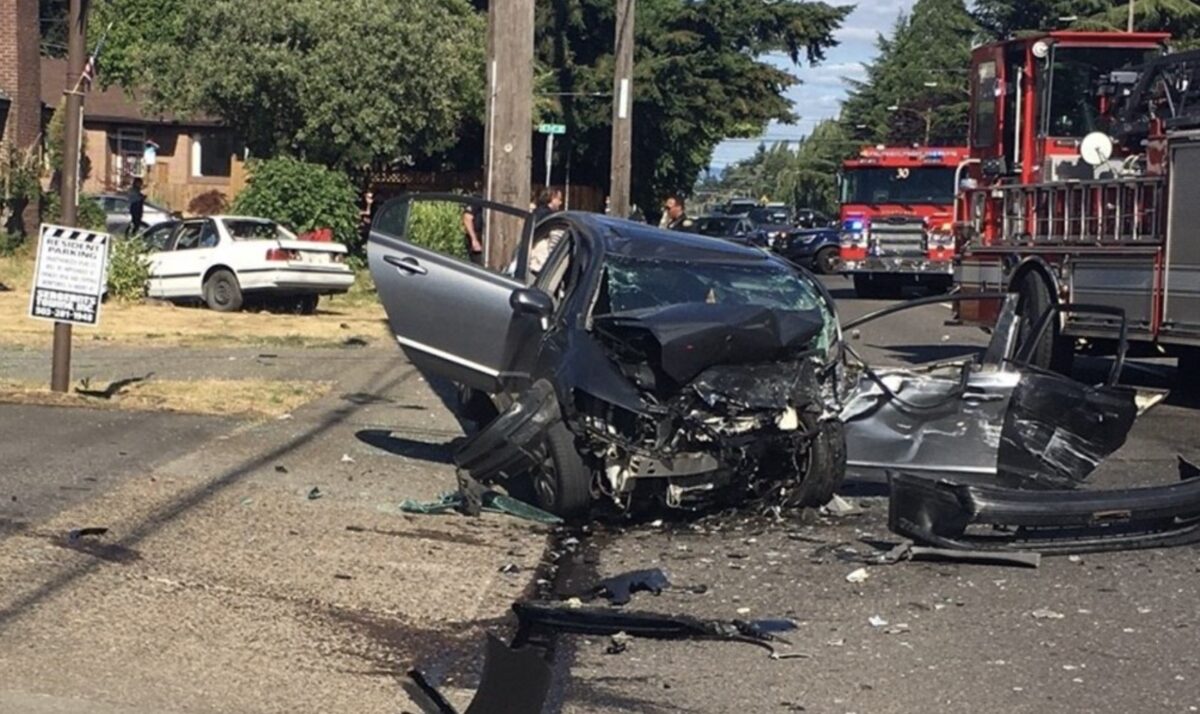
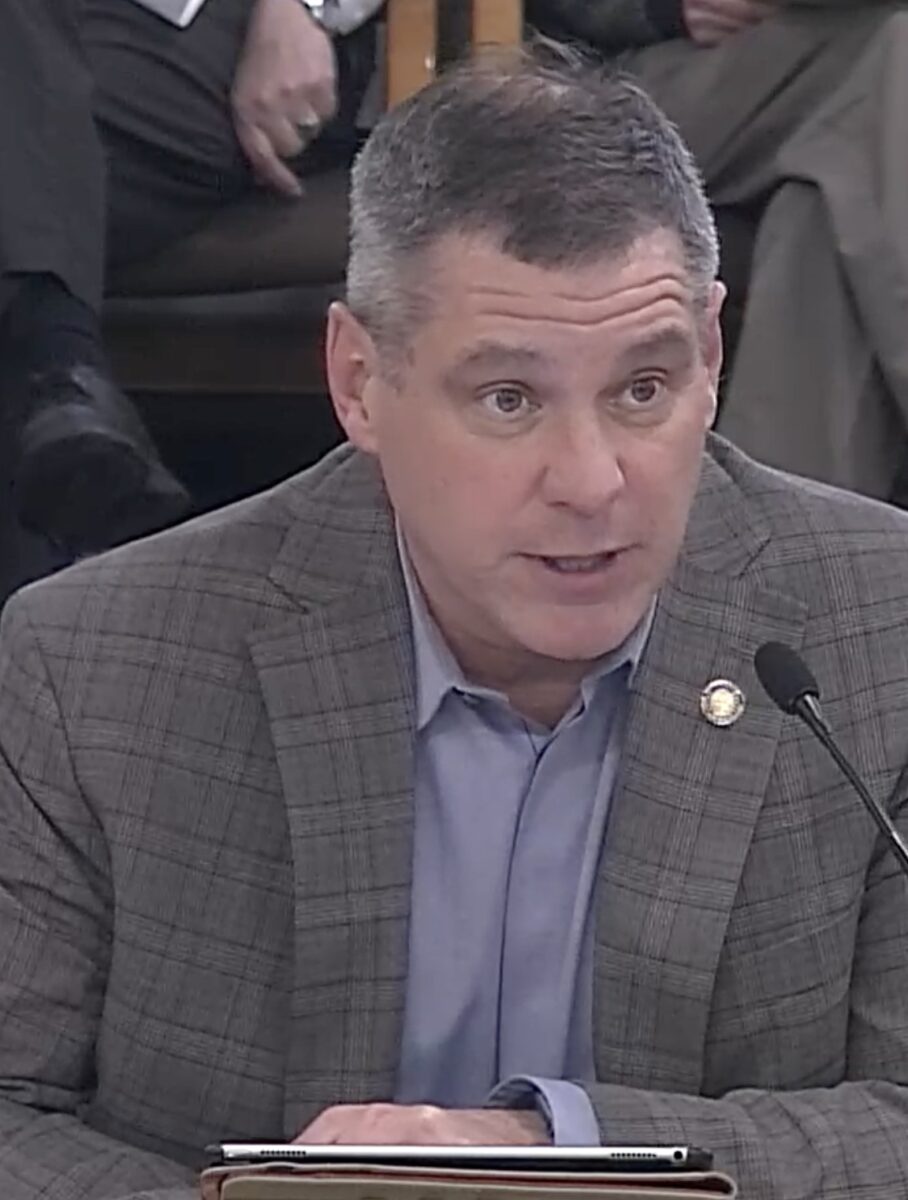
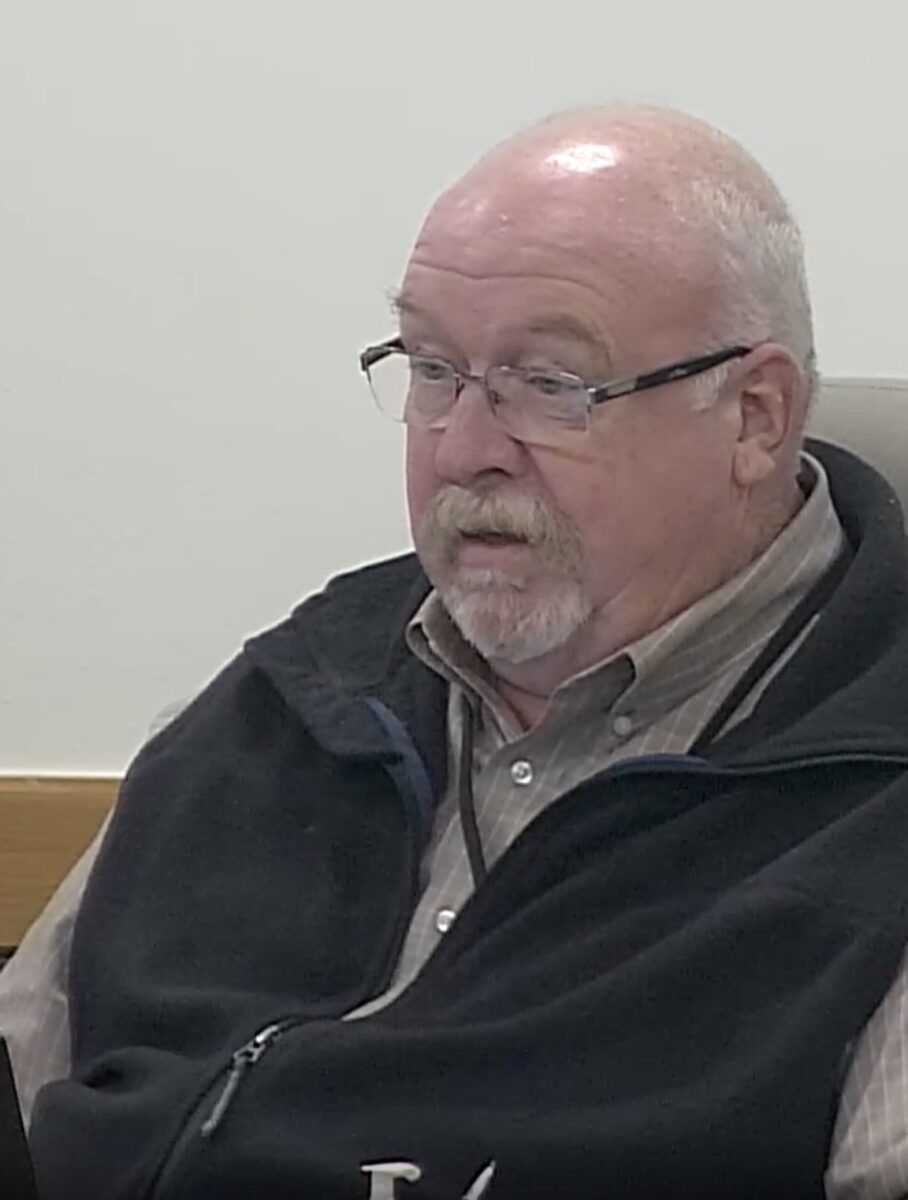
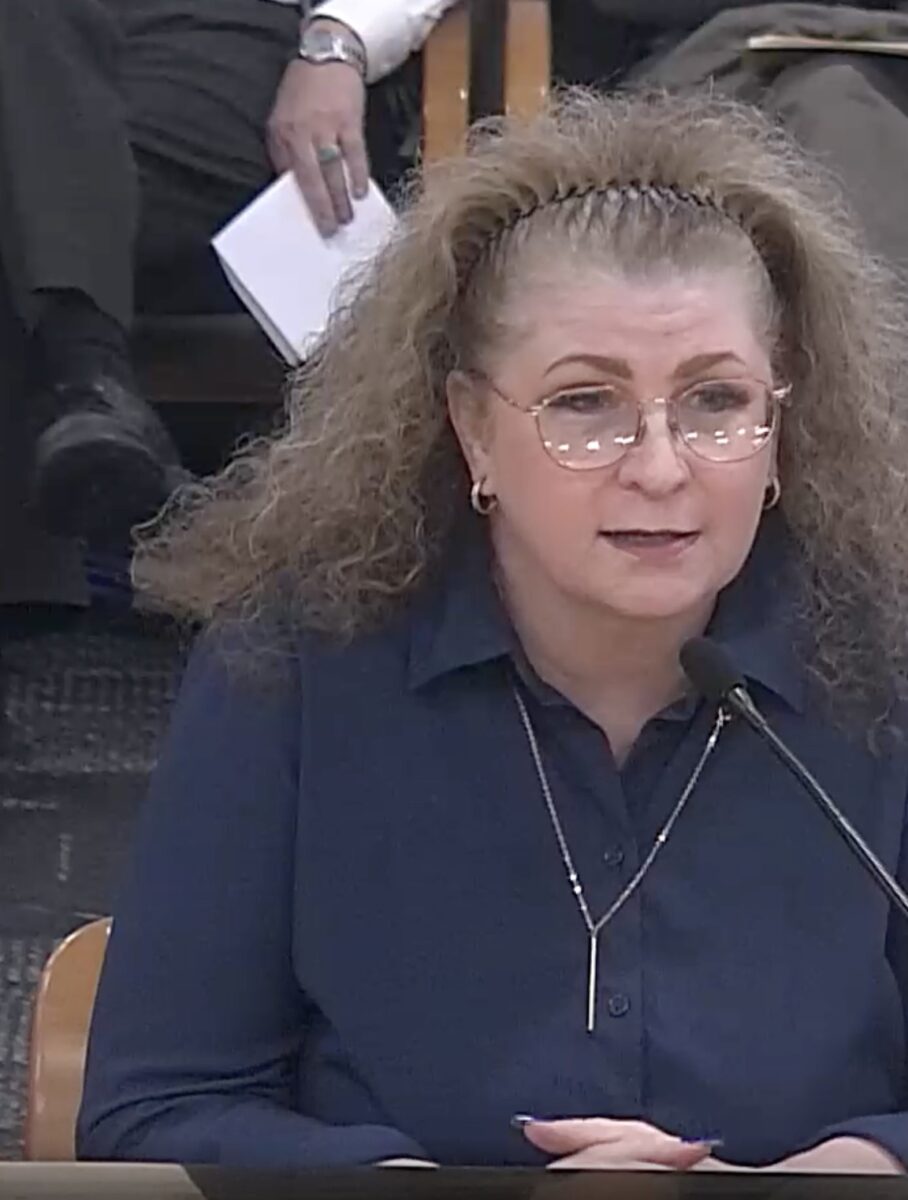
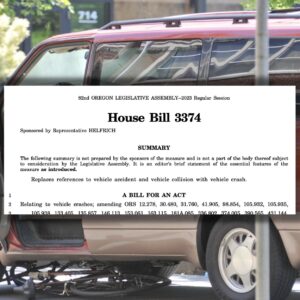
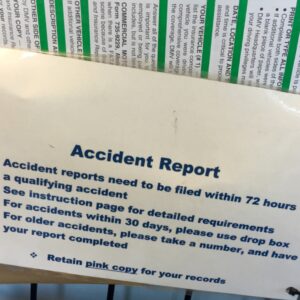

Thanks for reading.
BikePortland has served this community with independent community journalism since 2005. We rely on subscriptions from readers like you to survive. Your financial support is vital in keeping this valuable resource alive and well.
Please subscribe today to strengthen and expand our work.
Sigh. Whether an incident is preventable or not has no bearing whatsoever on whether it is accidental or not.
We could call it an “incident”, or a “crash”. The whole concept of the English word “accident” seems to be to deflect blame or say no-one’s to blame. Maybe that’s okay for spilling a glass of wine, but if you’re piloting a several-ton vehicle, and your vehicle and a person object collide, someone (or something? a falling building?) is to blame.
The definition of accident doesn’t technically deal with blame, but rather how anticipated or deliberate the act was.
https://www.google.com/search?client=firefox-b-1-d&q=define+accident
The more nasty connotation of ‘accident’ is that what happened was unavoidable and that actors involved where acting as responsible as possible when the incident. A la “theres nothing the motorist could have done”.
Hitting someones loose dog very well could be an accident. I can see a situation where a motorist is driving at or below the speed limit, paying full attention to the road. At the same time perhaps a dog on a leash gets spooked and unexpectedly slips its collar and runs into the road right in front of the car. Even good drivers can’t defy the laws of physics and even good pet owners might not realize their dogs collar wasn’t as tight as it needed to be. I would call that a true accident.
Where the nastyness comes in is when that same motorist is driving 10mph over the speed limit, or playing on their phone, or realistically both.It might be the case that speeding or not speeding made no impact on the end result, but its hard for me to call that an accident because a motor vehicle should expect that driving too fast will make it harder to stop in an emergency situation and that by doing so, they are deliberately acting in a dangerous manner.
I think ‘accident’ is used because if we paint traffic violence as an inevitable part of life, we don’t need to do anything to change it. It helps normalize traffic violence.
That is simply untrue. Industrial safety, construction safety, airline safety, and medicine are among the many fields where professionals use the word “accident” and regularly attribute blame. The only people who seem to be confused by this are a particular breed of transportation activists.
The ex-cop proposing this bill obviously disagrees.
When I rode out of the driveway 3 weeks ago, hit a patch of black ice and crashed and broke my pinky (a fracture of the proximal phalanx of the 5th finger of the right hand to be precise) it was a crash.
But, not an accident since (by def. C in Merriam Webster) calling it that would imply that there was no fault or misconduct on my part.
I screwed up. I knew the conditions were right for black ice and I didn’t slow down and turn in an upright posture.
Not an accident, but definitely a crash.
Using accident in all cases (as we have for ages) brings with it an implicit exoneration. Calling it a crash or collision does not.
Precision matters.
I have zero objections to you describing your incident as a crash if you think that is the best description of what you experienced. None at all. I would probably do the same.
But, since you brought it up, let’s have a look at Merriam Webster. 2a refers to a traffic accident, defining it as “an unfortunate event resulting especially from carelessness or ignorance”.
That sounds like what happens when you don’t slow down for black ice.
1.
a an unforeseen and unplanned event or circumstance
Their meeting was an accident.
b lack of intention or necessity : CHANCE
They met by accident rather than by design.
2.
a an unfortunate event resulting especially from carelessness or ignorance
was involved in a traffic accident
b medical : an unexpected and medically important bodily event especially when injurious
a cerebrovascular accident
c law : an unexpected happening causing loss or injury which is not due to any fault or misconduct on the part of the person injured but for which legal relief may be sought
d US, informal —used euphemistically to refer to an uncontrolled or involuntary act or instance of urination or defecation (as by a baby or a pet)
The puppy had an accident on the rug.
3.
a a nonessential property or quality of an entity or circumstance
the accident of nationality
https://www.merriam-webster.com/dictionary/accident
Since we’re being pedantic, 1a refers to “an unforeseen and unplanned event”. Traffic crashed are in no way “unforeseen”. They are the predictable result of road design and human psychology.
*traffic crashes
If I could foresee traffic crashes I was involved in, I would stay home that day. Crashes are almost always unplanned and unforeseen events.
Knowing that, statistically, something is likely to happen to someone at some point is very different than “foreseeing” it.
You keep demonstrating how far you have to strain credibility to make your point.
If you work at a preschool and take your pet crocodile to work with you, is it an “accident” when the crocodile eats a toddler? After all, you surely didn’t *intend* for that to happen, so I guess it’s just nobody’s fault!
Do you really believe anyone would be confused about whose fault the unintended incident was if I stated that my dropping the leash was accidental?
Intentionality and fault are orthogonal — they have no bearing on one another, and the fact that you struggle to make a convincing case even using a highly contrived scenario is telling.
Intentionality and fault are both implied in the dictionary definition *you* quoted. Or does “carelessness” not imply fault to you?
Carelessness absolutely implies fault. That’s my point. Accidental doesn’t mean without fault; it means without intention.
Can we agree on that?
That’s a very narrow definition, which is the whole point of why we’re here.
It’s not narrow, it’s the whole thing. That’s just what the word means. It does not mean without fault or cause, despite what a lawmaker in Salem says and some here think, even in the face of contrary evidence.
So, if I were to eat ice cream and cookies for every meal, when I get diabetes, is it an accident? I surely didn’t intend to get a deadly disease. I just wanted to enjoy my favorite foods.
If you didn’t realize it would cause that, yes–accident would be accurate, even if you’d have to be very ill-informed to not realize that would be a likely outcome.
You can do this forever. If that’s not an accident, then what if you gave someone a peanut butter cookie and they died because they can’t tolerate peanuts, and you didn’t know that, and they didn’t realize it had peanuts in it? Would it be an accident? I’d say yes, even though peanut intolerance is widely known, similarly to diabetes. It gets pretty picky to say that’s an accident, but the diabetes example isn’t.
If a dog runs out from behind a car, and you swerve and crash, that’s exactly the situation most people would say is truly an accident. But is it really? if you consider someone let their dog run loose without a leash, or left their gate open, etc., with the dog running into the street being an easily foreseeable consequence. Or is it an accident on the part of the driver, but not overall an accident? You could argue forever.
And I certainly don’t find anything wrong with using “accident” for mountain climbing or aviation mishaps. In fact, “accident” is very typically used in those activities in analysis of “what caused the accident?” and that’s often something that someone should have known not to do–going out in bad weather, etc.
I like using “crash” in regulations, but I think Watt’s arguments are generally valid.
If you don’t realize that drinking and driving or speeding cause crashes, you shouldn’t have a drivers license.
If you smoke for 50 years and get lung cancer, it may be because of your negligence. But, it’s not an accident. It’s predictable and preventable based on behavior choices. If you claim ignorance, perhaps you haven’t ever been to a doctor or just don’t ever let anything they say settle in about how to take care of yourself.
Nothing sums up conservative ideology more than the “I don’t understand something and if I don’t understand it without zero effort, it must not be worth understanding”.
On the other hand, a rare non-crazy idea from a republican is very notable. It might be the only sensible thing they propose this session.
Do the proposed rewrites make the law better or worse? The last time we discussed this, I picked one of the cited laws at random:
The revised text would read:
The law is now more ambiguous than it was. What if the incident in question was not a crash (for example, a vehicle rolled backwards over someone’s foot because the parking brake was improperly engaged). Does this law still apply?
“Accident” or “incident” probably would be the best words to use here.
Original text: https://oregon.public.law/statutes/ors_742.542
Or another:
Again, if someone inures another party without a crash occurring, does the driver have a legal duty to attend to the injured person?
Original text: https://oregon.public.law/statutes/ors_811.705
“Crash into someones foot” sounds very exaggerated, however it probably resulted in some level of serious injury to the victim. Strong language makes sense to convey the severity of damage most car crashes are.
These laws cover a variety of scenarios, many of which are crashes, but some aren’t. I think it is far more important that the laws be clear than that they convey some abstract sense of severity in order to satisfy a political agenda.
Sure, where crash is clearer, let’s use it. But it’s not a good blanket replacement for accident because not all accidents are crashes, and not all crashes are accidents (though most are).
This is the legislature we are talking about. Everything is an agenda to reach some kind of political ideal. Much like when the word “accident” was chosen, the decision was representing the political attitudes at the time, intentional or not.
Why is it not a good blanket statement to label everything as a crash? How can a car cause damage without some sort of collision? I guess if a car spontaneously blows up, but thats not exactly an accident either. I think labeling every car crash as some kind of whoopsiedoodle is ill-conceived.
“Whoopsiedoodle” is such a straw man argument — you can do better.
Using crash everywhere is bad because in some cases it makes laws less clear (or, as you noted, sound exaggerated, undermining its credibility), as shown in my examples.
I am sure there are places where the word crash would clarify the law. In those cases I have no problem making the change.
For all the semantics people apply to either term, a subversive reading of “accident” is much more dangerous than “crash,” never mind that the statutes almost definitely have a section for definitions.
It’s not often that I find myself on the side of neoprohibitionists like MADD or neo… never mind…like Republicans. I’d love to see more of these strange bedfellows showing sincere interest in the people’s welfare.
If I were a bike hater, I can’t think of a better way to disable them than to get them bickering about nothing. Anyone who thinks there’s any real practical impact to the lingo issue breaking one way or the other is kidding themselves